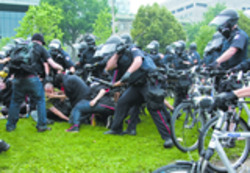Horror stories keep coming at G20 hearings
Independent Civilian Review opens with deputations from public
By Ellie Kirzner
I was prepared for restlessness, Wednesday night, as I headed down to Metro Hall for the first of three public hearings of the Independent Civilian Review of G20 policing.
I got lots of tea and picked out a seat in the first row so I’d be sure to stay alert. After all, I’ve already sat through several rounds of G20 deputations and it was easy to assume I’d heard all the major atrocity stories out there on the themes of kettling, detention, horse attacks, random snatches, tear gas and targetted terrorizing.
But, as I realized Wednesday night in the Hall foyer, as the three hours whizzed by, every G20 narrative is a very personal history, and they’re all the same — and completely different.

My other reason for edginess was the fact that, while the review has “independent’’ in its name, it’s a creation of the Police Services Board and therefore, not really very independent at all. In fact, way back when the terms of reference for this review were being developed, civil rights lawyer Julian Falconer actually urged the board to nix the project entirely.
His argument was that given the crisis of confidence created by police actions, the board was in a conflict of interest and could not credibly investigate its own conduct. The board, he said, “is implicated.’’ (See earlier story.)
So the big question is whether Justice John W. Morden, the lead reviewer, can pull off a report that explains, rather than explains away, how it was civilian oversight failed G20 protesters.
In this vein, the official mandate for the Wednesday hearing didn’t exactly inspire confidence; “what role should civilian oversight play with respect to the policing of major events?’’ seemed, at first blush, to offer pretty limited conversation, given the scope of G20 events.
I needn’t have worried. Contributors took their license and talked far and wide and chair, Morden, never attempted to curb the proceedings. Indeed, he only had one follow-up question and an intriguing one it was: he asked labour activist, Robert DeMatteo if he had further thoughts on what the board did or should have done as G20 events were unfolding. Now that’s a fruitful investigation topic if ever there was one.
The key issue was raised by Graeme Norton, of the Canadian Civil Liberties Association. He referred to the “ambiguity around what is [board] policy and what is operational.’’ This is the ever-recurring issue of defining how much power civilian overseers should have over the actual detail of police operations as opposed to just delineating guiding principles.
Can’t wait to see how Morden’s report deals with this baby.
No question, the former associate chief justice of Ontario had to listen to some scorching stuff from the 23 participants.
Falconer may have counselled against the review way back, but he was there Wednesday night pointing in disdainful tones to the “cat and mouse’’ scenario between police and the SIU in the Dorian Barton and Adam Nobody cases (he’s Nobody’s lawyer), and the fact police hid their identities (“symbolic of a cover-up’’) and now protect colleague transgressors (“a blue wall of silence’).
(See past story on police oversight issue)
U of T grad student, Victor Mulligan followed up this theme. The mandatory wearing of badges is board policy, he reminded the room as he held up a number of his own photos from demos since last June, including the recent Slutwalk, showing officers with their name tags removed.
Displaying a shot of a G20 snatch and grab, Mulligan said it reminded him of the “juntas of Chile’’ and that police acted “as the judiciary and used arrests as punishment.’’ Justice Morden, he said emotionally, “you are the upholder of the Charter of Rights.’’
Alex Van Thorn, a science fiction fan/activist had a similar take — police action was unrelated to any crime or security threat and was mere “retaliation’’ for a scale of vandalism not much more serious than what occurs after a major sport win. “The vandals didn’t hurt anyone; the only threat to people was from police,’’ he said.
Van Thorn had a therapeutic offering: the city could heal damaged cop/if it mailed an apology to each person arrested and handed over monetary compensation for every hour spent in detention. “Toronto has to restore the broken social contract,’’ he urged.
Oddly, it was neither a protester or victimized bystander who scored the zinger of the evening. Jeff Cohen, owner of the Horseshoe explained that windows at his club often get broken and when it happens, officers tell him, “Ah, just a misdemeanor.’’ So, why, he asked, if someone puts on black and smashes glass, does the misdemeanor become the cause of the “biggest police operation in Canadian history.’’
Here’s hoping Morden gets to that one.
For details on the other two hearings: http://www.tpsb.ca/News_Releases/task,view/id,150/
Source: http://www.nowtoronto.com/daily/news/story.cfm?content=181045



